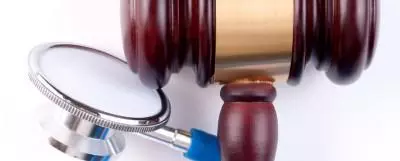Latest Medical and Healthcare Law News
Physician License Reinstatements After a Felony Conviction
If you are a physician who lost your medical license due to a felony conviction, your career is not over! You have the right to apply to have your medical license reinstated. If you can show enough mitigation and rehabilitation evidence, there is a good chance that you can get your license back. A physician seeking to reinstate his/her medical license after a felony criminal conviction is required to submit what is called a Petition for Reinstatement. The petitioning physician bears the burden of proof to convince the Board that they are safe to practice medicine, even in light of the prior criminal conviction. The Board will consider not only the record of the conviction itself, but also the underlying issues which led to the arrest and conviction.
Physicians with prior felony or other criminal convictions (such as insurance fraud, selling or illegally prescribing controlled substances, etc.) can regain their medical license and livelihood. It is by no means an easy process, but with enough evidence of rehabilitation and mitigation, even physicians who have spent time in jail/prison can get their medical license reinstated.
There are specified waiting periods for when a physician is eligible to submit a Petition for Reinstatement, depending on the prior license discipline. In most cases, after a license revocation or surrender, a physician must wait a minimum of three years before they are eligible to submit a reinstatement application. Certain settlement agreements may allow a physician to apply for reinstatement after just two years (sometimes one-year if the surrender was due to a medical reason). A physician is precluded from applying if he/she is still incarcerated or remains on criminal court-imposed probation.
The physician is required to provide the following documents and information to initiate the reinstatement process:
- At least two letters of Support from other licensed physicians who support reinstatement and aver to the petitioning physician’s competence.
- A written narrative signed by the physician describing the rehabilitative efforts that the physician has completed and essentially why they are worthy of a second chance at obtaining a medical license.
Once the Petition for Reinstatement process is started, the attorney representing the Medical Board will file a pleading called a Statement of Issues which will usually argue against reinstatement and sets forth the issues of concern to the Board for why the physician is unsafe to practice. A hearing will then be scheduled before an Administrative Law Judge (“ALJ”) who will hear the evidence and make a proposed decision to the Board.
When issuing a Proposed Decision, the ALJ will consider the physician’s original offense, actions taken since the discipline, rehabilitative efforts, and reputation for honesty and professional ability, among others. After the ALJ issues a proposed decision, the Medical Board then has up to 100 days to approve, modify, or reject the ALJ’s decision. A physician has the right to appeal the Board’s final decision through a Writ of Mandate process [hyperlink to writ of mandate page].
Evidence demonstrating rehabilitation and mitigation is critically important in a Petition for Reinstatement. Each situation is unique, but common examples of evidence that would be helpful to present to prove rehabilitation and mitigation include letters from supervisors, fellow physicians, patients, family members or friends. In order for these letters to be useful, it is important that these people be aware of the issues involved in the underlying criminal matter and are also familiar with what the physician has done since the conviction to rehabilitate themselves.
Other materials which are important to present at a reinstatement hearing include:
- Pertinent documents from the criminal case showing all court requirements have been met.
- Sometimes opinion letters and testimony from mental health providers are important to present.
- Certificates of continuing education or additional certifications is also valuable evidence showing mitigation and rehabilitation.
- If the physician is working, a statement from their current employer describing his/her employment history and any performance evaluation from their current or previous jobs as a physician.
- Proof of any volunteer work or other community service hours required by the court can also be useful to show a continued dedication to the medical profession.
If you have had your medical license revoked or you surrendered it due to a felony or other criminal conviction, contact our professional licensing defense attorneys today for a free consultation to evaluate your situation to see if you qualify for reinstatement and discuss your chances of getting your license reinstated. While physicians are allowed to represent themselves in license reinstatement proceedings, it is highly recommended that you contact an experienced healthcare license defense attorney to assist in preparing the petition for reinstatement packet and to represent you at the administrative hearing before the Medical Board.
Additional Links:
https://www.mbc.ca.gov/Download/Forms/dg-39a.pdf
https://www.mbc.ca.gov/Download/Forms/ps-live-scan.pdf
https://www.mbc.ca.gov/Download/Forms/dg-39c.pdf
References:
https://www.mbc.ca.gov/Forms/Penalty_Relief.aspx#:~:text=Business%20and%20Professions%20Code%20Sections,or%20modification%20of%20the%20penalty
https://www.rn.ca.gov/enforcement/convictions.shtml
https://www.mbc.ca.gov/Licensees/Criminal_Conviction.aspx
https://californiahealthline.org/morning-breakout/state-medical-board-reinstated-licenses-after-felony-charges/
When you subscribe to the blog, we will send you an e-mail when there are new updates on the site so you wouldn't miss them.
Protect Your Rights. Contact us Now.
We offer a free confidential phone or Zoom consultation.
Timing can be critical. Call us now at 1-800-529-MDJD, or click the contact button to email us today!
Law Firm of Marvin Firestone, MD•JD, & Associates, LLP. All rights reserved. Disclaimer | Privacy Policy | Site Map

